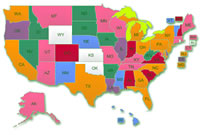If you don’t have credit in your name.
Then, you need to get some! Getting your first credit card can be tricky, because many credit card companies want to see a credit history before they give you credit, and you need to develop a credit history by having a credit card account. Seems like an endless Catch-22, right?
Well, not exactly. Before you accept one of those mail offers that charges a huge “initiation” or “account maintenance” fee, try these approaches.
- Contact your local credit union. Often, credit unions can bend the rules a bit for their members and give your credit a jump-start with your first credit card (secured or unsecured) that offers a decent rate and no annual fees.
- Contact your local department store to see if they will offer you a card (and a discount on that day’s purchases!) or contact a small, local bank for a personal loan. Some smaller institutions have more relaxed criteria and will be willing to help you get your start.
- Contact companies that specialize in working with people who need to establish credit, Check out www.lendingtree.com or www.bankrate.com for names, phone numbers, and online deals.
If you already have credit in your name.
Then it’s important that your credit report is accurate. Read on for more information on how to check your credit report and fix any errors you might find.
The accuracy of your credit report is critical, because it can be used by lenders to decide the interest rate on a loan, by prospective employers to screen job applicants, and by insurance companies to price policies. In addition, your creditors regularly review your credit profile, even if you have a good payment history.
Your credit report reveals many things about your financial habits. It shows how many bank cards and charge accounts you currently have, as well as those you have had in the past, and whether they were paid when closed. For each card or account, your credit report tells the current amount you owe, when you made the last payment, whether your payments have been made on time, and your credit limit or the largest amount you have owed on the card or account. Your credit report also lists any judgments against you, liens, bankruptcies, and foreclosures on real estate you owned.
These items will ding your credit, so avoid them if you can:
- Too many credit cards, even if they have zero balances
- High non-mortgage debt
- Delinquent accounts or frequent late payments
- Frequent job or address changes
- Bills marked uncollectible
- Bankruptcy
How to Read and Correct Your Credit Report
What can you do to improve your credit? First, get a copy of your credit report. By Federal law you are entitled to a free copy of your credit report if you have been denied credit based on information in the report and request a copy within 60 days, if you are unemployed and intend to apply for a job within 60 days of your request, if you’re on public assistance, or if your report contains errors due to fraud. Otherwise, the cost to order a credit report is generally around $15.
The three major credit bureaus are:
| Trans Union | TransUnion.com | (800) 888-4213 |
| Equifax | Equifax.com | (800) 525-6285 |
| Experian | Experian.com | (888) 397-3742 |
If you purchase your credit report online, you will be able to view it immediately and dispute any incorrect items online. This will save you considerable time and hassle-and it’s a very easy process. If you have regular access to a computer and to e-mail, this is the method we recommend.
When you receive your report, go through it with a fine-tooth comb, and be sure you understand fully the various codes and abbreviations that are used. If you find incorrect information, contact the credit bureau immediately and ask that it be corrected.
If the source of the incorrect information is a lender or credit card company, you will have to ask that company to furnish corrected information to the credit bureau. If the information cannot be corrected, or doesn’t tell the full story as reported (such as extenuating circumstances for delinquent payments), you may put a written statement of 100 words or less in your file at the credit bureau, to be transmitted along with your payment history whenever a potential creditor accesses your file.
When you take action to correct a mistake in your credit report, be sure to keep a copy of the correspondence in your files. Also, realize you may have to make the same request again in the future, since credit reporting agencies are notorious for dragging their feet. If at any point you speak to a credit bureau representative on the phone, make a note of the date and time of your call and exactly what was discussed. With patience and persistence, you can resolve disputes and clean up your credit history, so you can move forward with your plans for the future.
How to Improve Your Credit History
Improving your credit history takes time. You must create a record of timely payments, reduce the balance outstanding on your accounts, reduce your required monthly payments, and give past credit problems a chance to fade away. Because bankruptcies stay on your record for ten years and other credit problems may remain for seven years, bankruptcy, skipped payments, and foreclosures should be a last resort in dealing with financial woes.
Clean up any legitimate debts you still owe. Contact your creditors to see if they will settle for less than the full amount, or perhaps wipe the past-due status off your record in exchange for payment. Negotiate the best deal you can.
Once all of the negative items are cleared up, work on getting the right number of credit card accounts. You don’t want too many and you don’t want too few-you want it j-u-s-t right. Keep a few accounts open, use them regularly, and pay them off every month, with no late payments.
IMPORTANT: Don’t do business with companies that promise to “fix” your bad credit or improve your credit rating for a fee. If you need help, contact a non-profit organization, such as the National Foundation for Credit Counseling (1-800-388-2227).









